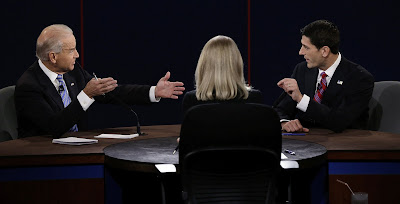Friday, October 12, 2012
VP Debate and Foreign Policy
At the end of the Vice Presidential debate, Paul Ryan asked the essential question that Americans answer every four years when they think about who should be the next president: “We face a very big choice. What kind of country are we going to be?”
A big problem for the Romney campaign has been painting a distinctly different vision of the future. On foreign policy, the Romney/Ryan ticket is in the awkward position of having to differentiate itself from a foreign policy that has, for the most part, been hiccup-less. As someone who loves foreign affairs, in the eros sense of the word, the VP debate was a can’t miss. The problem is, there just isn’t much difference between Obama’s foreign policy and Romney’s would-be foreign policy.
There is one simple reason for this. The grand strategic debate at the highest level has already been settled: the United States should stay world number one. Foreign policy wonks will debate concepts like off-shore balancing (a strategy of restraint that opts to play regional powers off of each other rather than actively getting involved), selective engagement (a strategy that advocates active US involvement only in the most strategically vital regions), and primacy (a strategy that calls for US dominance and dissuasion of any peers from challenging the U.S.). But the central tenets of American grand strategy since the end of the Cold War have not changed: we need to stay world number one and we need to promote democracy abroad where possible.
We do face a choice this election, but it is a choice about operationalizing a vision for America’s role in the world under primacy.
The Republican vision of US primacy calls for a large US military, an unwavering commitment to America’s exceptional character, and a willingness to act unilaterally when the support of our allies cannot be assured. It is in short, “peace through strength.” The world is full of hostile aggressors and the only way they can be stopped is by American command of the global commons. The alternative to US primacy is chaos which means we cannot appear weak against would-be revisionist states.
The Democrats’ version of primacy looks quite different. They are less likely to act unilaterally when they cannot gain the support of their allies and are more prone to establishing and upholding international law. Their unbridled pride in the American way of life is less explicit (just look how much bigger Ryan’s American flag pin was at the debate), hence terms like “apologizer-in-chief.”
If my description of the two sides is accurate, then it looks like there really is a choice between the two sides, that there really are noticeable differences between the two platforms. I would counter that yes, there are differences, but they are about how we should execute a predetermined strategy of global primacy. The current debate is not about whether we should reconsider our role in the world. It is about how we can best assert our dominance in world affairs.
As far as foreign policy is concerned, there kinda sorta is a choice to be made, but underlying the debate between Romney-Ryan/Obama-Biden are a set of assumptions about the role of the United States in the world, namely, that we need to stay number one. While we here in the United States can see the differences between the two sides, the rest of the world tends to see a general sameness because in practice, there is little variation in America’s behavior abroad.
Subscribe to:
Post Comments (Atom)


No comments:
Post a Comment